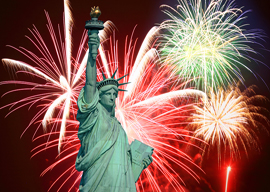
July 05, 2018

Source: Bigstock
It has become fashionable to equate the French and American Revolutions, but they share absolutely nothing beyond the word “revolution.” The American Revolution was a movement based on ideas, painstakingly argued by serious men in the process of creating what would become the freest, most prosperous nation in the history of the world. (Until Democrats decided to give it away to the Third World.)
The French Revolution was a revolt of the mob. It was the primogenitor of the horrors of the Bolshevik Revolution, Hitler’s storm troopers, Mao’s Cultural Revolution, Pol Pot’s slaughter and America’s periodic mob uprisings, from Shays’ Rebellion to the current attacks on White House employees and Trump supporters.
The French Revolution is the godless antithesis to the founding of America.
One rather important difference is that Americans did win freedom with their revolution and created a self-governing republic. France’s revolution consisted of pointless, bestial savagery, followed by another monarchy, followed by Napoleon’s dictatorship and then finally something resembling an actual republic 80 years later.
Both revolutions are said to have come from the ideas of Enlightenment thinkers, the American Revolution influenced by the writings of John Locke and the French Revolution informed by the writings of Jean-Jacques Rousseau. This is like saying presidents Reagan and Obama both drew on the ideas of 20th-century economists—Reagan on the writings of Milton Friedman and Obama on the writings of Paul Krugman.
Locke was concerned with private property rights. His idea was that the government should allow men to protect their property in courts of law, in lieu of each man being his own judge and executioner. Rousseau saw the government as the vessel to implement the “general will” and create a new man. Through power, the government would “force men to be free.”
As historian Roger Hancock summarized the theories of the French revolutionaries, they had no respect for humanity “except that which they proposed to create.” To liberate man, they would “reconstruct his very humanity to meet the demands of the general will.”
Liberals dearly wish our Founding Fathers were more like the godless French peasants, skipping around with human heads on pikes. But alas, our Founding Fathers were God-fearing descendants of Puritans and Presbyterians. (And one Catholic!) King George denounced the American Revolution as “a Presbyterian war.”
As Stephen Waldman writes in his definitive book on the subject, “Founding Faith,” the American Revolution was “powerfully shaped by the Great Awakening,” an evangelical revival in the Colonies in the early 1700s, led by famous Puritan theologian Jonathan Edwards, among others. Aaron Burr, the third vice president of the United States, was Edwards’ grandson.
There are books of Christian sermons endorsing the revolution. The barbaric attacks on the church by the French revolutionaries would later appall Americans and British alike, even before the bloodletting began.
Americans celebrate the Fourth of July, the date our written demand for independence from Britain was released to the world.
The French celebrate Bastille Day, a day when a thousand armed Parisians stormed the Bastille and savagely murdered a half-dozen guards, defacing their corpses and sticking their heads on pikes—all in order to seize arms and gunpowder for more such tumults. It would be as if this country had a national holiday to celebrate the Ferguson riots.
Among the most famous quotes from the American Revolution is Patrick Henry’s “Give me liberty or give me death!” Among the most famous quotes from the French Revolution is the Jacobins’ “Fraternity or death!” Or, as Jacobin Sebastien Nicolas de Chamfort satirized it: “Be my brother or I’ll kill you.”